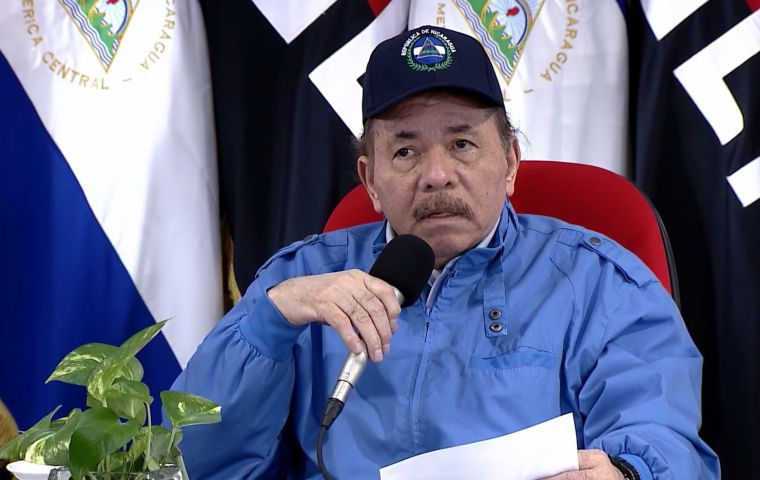MercoPress. South Atlantic News Agency
Nicaragua breaks up with the Holy See
 Ortega made his decision as the Argentine Pope was reaching his 10th anniversary as head of the Catholic Church
Ortega made his decision as the Argentine Pope was reaching his 10th anniversary as head of the Catholic Church Nicaraguan President Daniel Ortega chose to sever diplomatic ties with the Vatican after Pope Francis dubbed the Sandinista regime as a “Hitlerian dictatorship” headed by a leader who would suffer from some sort of “imbalance.” The Pope also praised imprisoned Nicaraguan Bishop Rolando José Álvarez, “a very serious man” who “wanted to give his testimony and did not accept exile.”
Nicaragua has not had an ambassador to the Apostolic See since September 21, 2021, when Ortega canceled the appointment of Elliette Ortega Sotomayor. Thus, Ortega and his Vice President wife Rosario Murillo put an end to at least 115 years of diplomatic liaison between Nicaragua and the Holy See.
The Sandinista State thus joins a group of countries that do not maintain diplomatic relations with the Holy See, four of which have communist governments (Vietnam, North Korea, China, and Laos), 8 are under Muslim rule (Somalia, Oman, Mauritania, Maldives, Comoros Islands, Brunei, Afghanistan, and Saudi Arabia), and Bhutan is a Buddhist kingdom in Asia.
Ortega has repeatedly dubbed Nicaraguan bishops as “terrorists” and “coup plotters,” accomplices of internal forces and international groups who seek “to overthrow him.” Monsignor Rolando José Álvarez, bishop of Matagalpa and apostolic administrator of the Diocese of Estelí, is confined to a maximum security cell in the penitentiary system of La Modelo, in Managua. He has been sentenced to 26 years in prison for “treason to the homeland” after refusing to be exiled together with 222 other Nicaraguan political prisoners who left for the United States, after which Ortega called him an “arrogant, unhinged madman.”
Meanwhile, Argentina's faithful celebrated 10 years of Francis' papacy with a mass Saturday in Luján celebrated by Father Pepe (José Di Paola) in the province of Buenos Aires under the slogan “Not one kid, not one girl less because of drugs.”
Father Pepe is a member of the movement of “villero” priests, so called because of their work focused on villas miserias (slums) that had strong backing from Jorge Bergoglio when he was archbishop of Buenos Aires before he was made pope on March 13, 2013.
In an interview published Friday in Buenos Aires' La Nación, Pope Francis also insisted that “gender ideology” was among the “most dangerous ideological colonizations” today. He also pointed out that “gender ideology” has created one of the most “dangerous” ideologies in recent history because of the way it blurs the lines between men and women.“
”The question of gender is diluting the differences and making the world the same, all dull, all alike, and that is contrary to the human vocation,” the Pope also noted while underlining he had always made a distinction between ”what pastoral care is for people who have a different sexual orientation and what gender ideology is.”




Top Comments
Disclaimer & comment rulesCommenting for this story is now closed.
If you have a Facebook account, become a fan and comment on our Facebook Page!